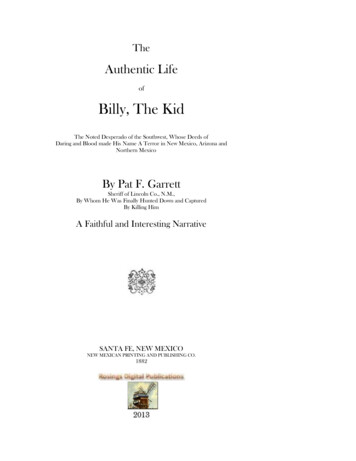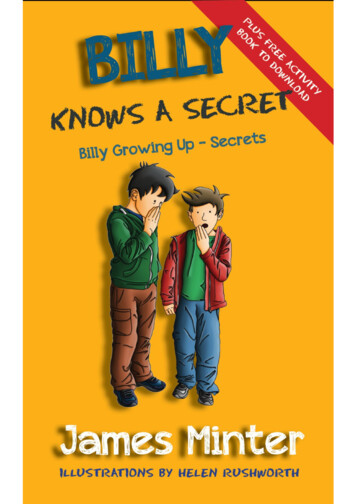
Transcription
TheAuthentic LifeofBilly, The KidThe Noted Desperado of the Southwest, Whose Deeds ofDaring and Blood made His Name A Terror in New Mexico, Arizona andNorthern MexicoBy Pat F. GarrettSheriff of Lincoln Co., N.M.,By Whom He Was Finally Hunted Down and CapturedBy Killing HimA Faithful and Interesting NarrativeSANTA FE, NEW MEXICONEW MEXICAN PRINTING AND PUBLISHING CO.1882
COPYRIGHTED 1882
INTRODUCTORYYielding to repeated solicitations from various sources, I haveaddressed myself to the task of compiling, for publication, a truehistory of the life, adventures, and tragic death of William H.Bonney, better known as “Billy The Kid,” whose daring deeds andbloody crimes have excited, for some years last past, the wonder ofone-half of the world, and the admiration or detestation of the otherhalf.I am incited to this labor, in a measure, by an impulse to correctthe thousand false statements which have appeared in the publicnewspapers and in yellow-covered, cheap novels. Of the latter, noless than three have been foisted upon the public, any one of whichmight have been the history of any outlaw who ever lived, but weremiles from correct as applied to “The Kid.” These pretend to disclose his name, the place of his nativity, the particulars of his career,the circumstances which drove him to his desperate life, detailing ahundred impossible deeds of reckless crime of which he was neverguilty, and in localities which he never visited.I would dissever “The Kid’s” memory from that of meaner villains, whose deeds have been attributed to him. I will strive to dojustice to his character, give him credit for all the virtues he possessed—and he was by no means devoid of virtue—but shall notspare deserved opprobrium for his heinous offenses against humanity and the laws.I have known “The Kid” personally since and during the continuance of what was known as “The Lincoln County War,” up tothe moment of his death, of which I was the unfortunate instrument,in the discharge of my official duty. I have listened, at camp-fires, onthe trail, on the prairies and at many different plazas, to his disconnected relations of events of his early and more recent life. In gathering correct information, I have interviewed many persons—since“The Kid’s” death—with whom he was intimate and to whom heconversed freely of his affairs, and I am in daily intercourse with onefriend who was a boarder at the house of “The Kid’s” mother, atSilver City, N. M., in 1873. This man has known Bonney well fromthat time to his death, and has traced his career carefully and notwith indifference. I have communicated, by letter, with various reliable parties, in New York, Kansas, Colorado, New Mexico, Arizona, Texas, Chihuahua, Sonora, and other states of Mexico, in orderto catch up any missing links in his life, and can safely guarantee thatthe reader will find in my little book a true and concise relation ofthe principal interesting events therein, without exaggeration orexcusation.I make no pretension to literary ability, but propose to give tothe public in intelligible English, “a round, unvarnished tale,” una-
AUTHENTIC LIFE OF BILLY THE KIDdorned with superfluous verbiage. The truth, in the life of youngBonney, needs no pen dipped in blood to thrill the heart and stay itspulsations. Under the nom de guerre “The Kid,” his most bloodyand desperate deeds were wrought—a name which will live in theannals of daring crime so long as those of Dick Turpin and ClaudeDuval shall be remembered. Yet, a hundred volumes have beenwritten, exhausting the imagination of a dozen authors—authorswhose stock in trade was vivid imagination—to immortalize these twolatter. This verified history of “The Kid’s” exploits, devoid of exaggeration, exhibits him the peer of any fabled brigand on record, unequalled in desperate courage, presence of mind in danger, devotionto his allies, generosity to his foes, gallantry, and all the elementswhich appeal to the holier emotions, whilst those who would revel inpictured scenes of slaughter may batten until their morbid appetitesare surfeited on bloody frays and mortal encounters, unaided byfancy or the pen of fiction.Risking the charge of prolixity, I wish to add a few words to this,my address to the public, vide, a sermon (among many others), recently preached in an eastern city by an eminent divine, of whichdiscourse “The Kid” was the literal, if not the announced text.Although I do not propose to offer my readers a sensationalnovel, yet, they will find it no Sunday school homily, holding up“The Kid” as an example of God’s vengeance to sinful youth. Thefact that he lied, swore, gambled, and broke the Sabbath in hischildhood, only proved that youth and exuberant humanity were rifein the child. He but emulated thousands of his predecessors, wholived to manhood and died honored and revered—some for publicand some for domestic virtues, some for their superior intellect, andmany more for their wealth—how attained the world will never pauseto inquire. “The Kid’s” career of crime was not the outgrowth of anevil disposition, nor was it caused by unchecked youthful indiscretions; it was the result of untoward, unfortunate circumstances actingupon a bold, reckless, ungoverned, and ungovernable spirit, whichno physical restraint could check, no danger appal, and no powerless potent than death could conquer.The sentiments involved in the sermon alluded to are asantedeluvian in monotonous argument, language, and sense, as theBlue Laws of Connecticut. Sabbath-breaking was the sole and inevitable cause of “The Kid’s” murders, robberies and bloody death(?).Immaculate mentor of the soul. “The Kid” never knew when Sunday came here on the frontier, except by accident, and yet, he knewas much about it as some hundreds of other young men who enjoythe reputation of model youth. And, suppose “The Kid” had knowingly violated the Sabbath? He had Christ and his disciples as holyexamples—confining his depredations, however, to rounding up abunch of cattle, not his own, instead of making a raid on his neighbor’s corn field and purloining roasting ears.
AUTHENTIC LIFE OF BILLY THE KID“The Kid” had a lurking devil in him; it was a good-humored,jovial imp, or a cruel and blood-thirsty fiend, as circumstancesprompted. Circumstances favored the worser angel, and “The Kid”fell.A dozen affidavits have been proffered me for publication, inverification of the truth of my work. I have refused them all withthanks. Let those doubt who will.PAT F. GARRETT.CHAPTER I.Parentage, Nativity, Childhood, and Youth—Prophetic Symptoms at EightYears of Age—Model Young Gentleman—Defender of the Helpless—A Mother—“Holy Nature”—A Young Bruiser—First Taste of Blood—A Fugitive—FarewellHome and a Mother’s InfluenceWilliam H. Bonney, the hero of this history, was born in the cityof New York, November 23d, 1859.But little is known of his father, as he died when Billy was veryyoung, and he had little recollection of him. In 1862 the family, consisting of the father, mother, and two boys, of whom Billy was theeldest, emigrated to Coffeyville, Kansas. Soon after settling there thefather died, and the mother with her two boys removed to Colorado, where she married a man named Antrim, who is said to be nowliving at, or near, Georgetown, in Grant County, New Mexico, and isthe only survivor of the family of four, who removed to Santa Fe,New Mexico, shortly after the marriage. Billy was then four or fiveyears of age.These facts are all that can be gleaned of Billy’s early childhood,which, up to this time, would be of no interest to the reader.Antrim remained at and near Santa Fe for some years, or untilBilly was about eight years of age.It was here that the boy exhibited a spirit of reckless daring, yetgenerous and tender feeling, which rendered him the darling of hisyoung companions in his gentler moods, and their terror when the
AUTHENTIC LIFE OF BILLY THE KIDangry fit was on him. It was here that he became adept at cards andnoted among his comrades as successfully aping the genteel vices ofhis elders.It has been said that at this tender age he was convicted of larceny in Santa Fe, but as a careful examination of the court recordsof that city fail to support the rumor, and as Billy, during all his afterlife, was never charged with a little meanness or petty crime, thestatement is to be doubted.About the year 1868, when Billy was eight or nine years of age,Antrim again removed and took up his residence at Silver City, inGrant County, New Mexico. From this date to 1871, or until Billywas twelve years old, he exhibited no characteristics prophesying hisdesperate and disastrous future. Bold, daring, and reckless, he wasopen-handed, generous-hearted, frank, and manly. He was a favoritewith all classes and ages, especially was he loved and admired by theold and decrepit, and the young and helpless. To such he was achampion, a defender, a benefactor, a right arm. He was never seento accost a lady, especially an elderly one, but with his hat in hishand, and did her attire or appearance evidence poverty, it was apoem to see the eager, sympathetic, deprecating look in Billy’s sunny face, as he proffered assistance or afforded information. A littlechild never lacked a lift across a gutter, or the assistance of a strongarm to carry a heavy burden when Billy was in sight.To those who knew his mother, his courteous, kindly, and benevolent spirit was no mystery. She was evidently of Irish descent.Her husband called her Kathleen. She was about the mediumheight, straight, and graceful in form, with regular features, light blueeyes, and luxuriant golden hair. She was not a beauty, but what theworld calls a fine-looking woman. She kept boarders in Silver City,and her charity and goodness of heart were proverbial. Many a hungry “tenderfoot” has had cause to bless the fortune which led him toher door. In all her deportment she exhibited the unmistakablecharacteristics of a lady—a lady by instinct and education.Billy loved his mother. He loved and honored her more thananything else on earth. Yet his home was not a happy one to him.He has often declared that the tyranny and cruelty of his step-fatherdrove him from home and a mother’s influence, and that Antrimwas responsible for his going to the bad. However this may be, afterthe death of his mother, some four years since, the step-father wouldhave been unfortunate had he come in contact with his eldest stepson.Billy’s educational advantages were limited, as were those of allof the youth of this border country. He attended public school, butacquired more information at his mother’s knee than from the village pedagogue. With great natural intelligence and an active brain,he became a fair scholar. He wrote a fair letter, was a tolerablearithmetician, but beyond this he did not aspire.
AUTHENTIC LIFE OF BILLY THE KIDThe best and brightest side of Billy’s character has been portrayed above. The shield had another side never exhibited to hisbest friends—the weak and helpless. His temper was fearful, and inhis angry moods he was dangerous. He was not loud or swaggering,or boisterous. He never threatened. He had no bark, or, if he did,the bite came first. He never took advantage of an antagonist, butbarring size and weight, would, when aggrieved, fight any man in Silver City. His misfortune was, he could not and would not staywhipped. When oversized and worsted in a fight, he sought sucharms as he could buy, borrow, beg, or steal, and used them, uponmore than one occasion, with murderous intent.During the latter portion of Billy’s residence in Silver City, hewas the constant companion of Jesse Evans, a mere boy, but as daring and dangerous as many an older and more experienced desperado. He was older than Billy and constituted himself a sort of preceptor to our hero. These two were destined to jointly participate inmany dangerous adventures, many narrow escapes, and severalbloody affrays in the next few years, and, fast friends as they nowwere, the time was soon to come when they would be arrayed inopposition to one another, each thirsting for the other’s blood, andneither shrinking from the conflict. They parted at Silver City, butonly to meet again many times during Billy’s short and bloody career.When young Bonney was about twelve years of age, he first imbrued his hand in human blood. This affair, it may be said, was theturning point in his life, outlawed him, and gave him over a victim ofhis worser impulses and passions.As Billy’s mother was passing a knot of idlers on the street, afilthy loafer in the crowd made an insulting remark about her. Billyheard it and quick as thought, with blazing eyes, he planted a stinging blow on the blackguard’s mouth, then springing to the street,stooped for a rock. The brute made a rush for him, but as he passedEd. Moulton, a well-known citizen of Silver City, he received a stunning blow on the ear which felled him, whilst Billy was caught andrestrained. However, the punishment inflicted on the offender by nomeans satisfied Billy. Burning for revenge, he visited a miner’s cabin, procured a Sharp’s rifle, and started in search of his intendedvictim. By good fortune, Moulton saw him with the gun, and, withsome difficulty, persuaded him to return it.Some three weeks subsequent to this adventure, Moulton, whowas a wonderfully powerful and active man, skilled in the art of selfdefense, and with something of the prize-fighter in his composition,became involved in a rough-and-tumble bar-room fight, at Joe Dyer’s saloon. He had two shoulder-strikers to contend with and wasgetting the best of both of them, when Billy’s “antipathy”—the manwho had been the recipient of one of Moulton’s “lifters,” standingby, thought he saw an opportunity to take cowardly revenge on
AUTHENTIC LIFE OF BILLY THE KIDMoulton, and rushed upon him with a heavy bar-room chair upraised. Billy was usually a spectator, when not a principal, to anyfight which might occur in the town, and this one was no exception.He saw the motion, and like lightning darted beneath the chaironce, twice, thrice, his arm rose and fell—then, rushing through thecrowd, his right hand above his head, grasping a pocket-knife, itsblade dripping with gore, he went out into the night, an outcast anda wanderer, a murderer, self-baptized in human blood. He went outlike banished Cain, yet less fortunate than the first murderer, therewas no curse pronounced against his slayer. His hand was nowagainst every man, and every man’s hand against him. He went outforever from the care, the love, and influence of a fond mother, forhe was never to see her face again—she who had so lovingly rearedhim, and whom he had so tenderly and reverently loved. Nevermore shall her soft hand smooth his ruffled brow, whilst soothingwords charm from his swelling heart the wrath he nurses. No mentor, no love to restrain his evil passion or check his desperate hand—what must be his fate?Billy did, truly, love and revere his mother, and all his after lifeof crime was marked by deep devotion and respect for good women, born, doubtless, of his adoration for her.“****from earlier than I know,Immersed in rich foreshadowing of the world,I loved the woman; he that doth not, livesA drowning life, besotted in sweet self,Or pines in sad experience worse than death,Or keeps his winged affections clipt with crime;Yet, was there one through whom I loved her, oneNot learned, save in gracious household ways,Not perfect, nay, but full of tender wants,No angel, but a dearer being, all diptIn angel instincts, breathing Paradise,Interpreter between the Gods and men,Who looked all native to her place, and yetOn tiptoe seemed to touch upon a sphereToo gross to tread, and all male minds perforceSwayde to her from their orbits, as they movedAnd girdled her with music. Happy heWith such a mother! Faith in womankindBeats with his blood, and trust in all things highComes easy to him, and though he trip and fall,He shall not blind his soul with clay.”Alas! for Billy. All the good influences were withdrawn from hispatch. The dove of peace and good will to his kind could find noresting place in his mind, distorted by fiery passion, and when deadly revenge shook his soul, he would have plucked the messengerfrom its perch, “though her jesses were his heartstrings.” He trippedand fell: he soiled his soul with clay.
AUTHENTIC LIFE OF BILLY THE KIDCHAPTER II.Steals His First Horse—Finds a Partner—Kills Three Indians for Plunder—AStar Gambler in Arizona—High Times in Tucson—Horse Race with Indian—NoShow to Lose—A Tight Place—Killing at Fort Bowie, and Flight from Arizona—Old MexicoAnd now we trace our fugitive to Arizona. His deeds of desperate crime in that Territory are familiar to old residents there but it isimpossible to follow them in detail, or to give exact dates. It is probable that many of his lawless achievements have escaped both written history and tradition. Records of the courts, at the Indian agencyand military posts, and reports from officers and citizens give all theinformation which can be obtained and cover his most prominentexploits. These reports tally correctly with Billy’s disconnected recitals, as given to his companions, in after years, to pass away an idlehour.After the fateful night when Billy first imbrued his hands inblood and fled his home, he wandered for three days and nightswithout meeting a human being except one Mexican sheepherder.He talked Spanish as fluently as any Mexican of them all, and secured from this boy a small stock of provisions, consisting of tortillasand mutton. He was on foot, and trying to make his way to the Arizona line. Becoming bewildered, he made a circuit and returned tothe vicinity of McKnight’s ranch, where he took his initiatory inhorse-stealing.The next we hear of Billy, some three weeks after his departurefrom Silver City, he arrived at Fort (then Camp) Bowie, Arizona,with a companion, both mounted on one sore-backed pony,equipped with a pack-saddle and rope bridle, without a quarter of adollar between them, nor a mouthful of provision in the commissary.Billy’s partner doubtless had a name which was his legal property, but he was so given to changing it that it was impossible to fix onthe right one. Billy always called him “Alias.”With a fellow of Billy’s energy and peculiar ideas as to the rightsof property, this condition of impoverishment could not continue.After recuperating his enervated physique at the Fort, he and hiscompanion, on foot (having disposed of their pony), with one condemned rifle and one pistol, borrowed from soldiers, started out onBilly’s first unlawful raid.As is generally known, Fort Bowie is in Pima County, Arizona,and on the Chiracahua Apache Indian Reservation. These Indianswere peaceable and quiet at this time, and there was no danger intrusting one’s self amongst them. Billy and his companion fell in
AUTHENTIC LIFE OF BILLY THE KIDwith a party of three of these Indians, some eight or ten milessouthwest of Fort Bowie in the passes of the mountains. A majorityof the different tribes of Apaches speak Spanish, and Billy was immediately at home with these. His object was to procure a mount forhimself and his companion. He tried arguments, wheedling, promises to pay, and every other plan his prolific brain could suggest—allin vain. These Indians’ confidence in white man’s reliability hadbeen severely shaken in the person of Indian Agent Clum.Billy gave a vague account of the result of this enterprise, yet uncompromising as it sounds, it leaves little to surmise. Said he:“It was a ground hog case. Here were twelve good ponies, fouror five saddles, a good supply of blankets, and five pony loads ofpelts. Here were three blood-thirsty savages, revelling in all this luxury and refusing succor to two free-born, white American citizens,foot sore and hungry. The plunder had to change hands—there wasno alternative—and as one live Indian could place a hundred UnitedStates troops on our trail in two hours, and as a dead Indian wouldbe likely to take some other route, our resolves were taken. In threeminutes there were three “good Injuns” lying around there, carelesslike, and, with ponies and plunder, we skipped. There was no fight.It was about the softest thing I ever struck.”The movements of these two youthful brigands for a few dayssubsequent to the killing of these Indians are lost sight of. It isknown that they disposed of superfluous ponies, equipage, and fursto immigrants from Texas, more than a hundred miles distant fromFort Bowie, and that they returned to the reservation splendidlymounted and armed, with money in their pockets. They were onthe best of terms with government officials and citizens at Fort Bowie, Apache Pass, San Simon, San Carlos, and all the settlements inthat vicinity, and spent a good deal of their time at Tucson, whereBilly’s skill as a monte dealer and card player generally kept the twoboys in luxuriant style and gave them enviable prestige among thesporting fraternity, which was then a powerful and influential element in Arizona.If anything was known by the authorities, of the Indian killingepisode, nothing was done about it. No one regretted the loss ofthese Indians, and no money could be made by prosecuting the offenders.The quiet life Billy led in the plazas palled upon his senses, and,with his partner, he again took the road, or rather the mountaintrails. There was always a dash of humor in Billy’s most tragical adventures. Meeting a band of eight or ten Indians in the vicinity ofSan Simon, the two young fellows proposed and instituted a horserace. Billy was riding a very superior animal, but made the race andbets on the inferior one ridden by his partner, against the best horsethe Indians had. He also insisted that his partner should hold thestakes, consisting of money and revolvers.
AUTHENTIC LIFE OF BILLY THE KIDBilly was to ride. Mounting his partner’s horse, the word wasgiven, and three, instead of two, horses shot out from the startingpoint. The interloper was Billy’s partner, on Billy’s horse. He couldnot restrain the fiery animal, which flew the track, took the bit in histeeth, and never slackened his headlong speed until he reached adeserted cattle ranch, many miles away from the improvised racetrack.Billy lost the race, but who was the winner? His partner with allthe stakes, was macadamizing the rocky trails, far beyond their ken,and far beyond successful pursuit. It required all Billy’s Spanish eloquence, all his persuasive powers of speech and gesture, all hissweetest, most appealing expressions of infantile innocence, to convince the untutored and unreasoning savages that he, himself, wasnot only the greatest loser of them all, but that he was the victim ofthe perfidy of a traitor—to them a heinous crime. Had not he, Billy,taken all the bets, and lost them all? Whilst their loss was dividedbetween a half-dozen, he had lost his horse, his arms, his money, hisfriends and his confidence in humanity, with nothing to show for itbut an old plug of a pony that evidently could not win a race againsta lame burro.When did youth and good looks, with well simulated injured innocence, backed by eloquence of tongue and hand-spiced with griefand righteous anger, fail to affect, even an Apache. With words ofcondolence and encouragement from his sympathizing victims, Billyrode sadly away. Two days thereafter, a hundred miles from thence,Billy might have been seen solemnly dividing spoils with his fugitivefriend.The last and darkest deed of which Billy was guilty in Arizonawas the killing of a soldier blacksmith at Fort Bowie. The date andparticulars of this killing are not upon record, and Billy was alwaysreticent in regard to it. There are many conflicting rumors in regardthereto. Billy’s defenders justify him on the ground that the victimwas a bully, refused to yield up money fairly won from him, by Billy,in a game of cards, and precipitated his fate by attempting to inflictphysical chastisement on a beardless boy. One thing is sure, thisdeed exiled Billy from Arizona, and he is next heard of in the Stateof Sonora, Republic of Mexico.CHAPTER III.Gay Life in Sonora—Killing of Don Jose Martinez—Taking Desperate Chances—Nerves of Steel—A Loud Call for Life—Deadly Aim—Cool as a Cucumber—ARide for Life and Lucky EscapeIn Sonora, Billy’s knowledge of the Spanish language, and hisskill in all games of cards practiced by the Mexican people, at once
AUTHENTIC LIFE OF BILLY THE KIDestablished for him a reputation as a first class gambler and hightoned gentleman. All that is known of his career in Sonora is gathered from his own relation of casual events, without detail or dates.He went there alone, but soon established a coalition with a youngMexican gambler, named Melquiades Segura, which lasted duringhis stay in the Republic.There is but one fatal encounter, of which we have official evidence, charged against Billy during his sojourn in Sonora, and thisnecessitated his speedy and permanent change of base. This was thekilling of Don Jose Martinez, a monte dealer, over a gaming table.Martinez had, for some weeks, persistently followed a course of bullying and insult towards Billy, frequently refusing to pay him moneyfairly won at his game. Billy’s entrance to the club-room was a signalfor Martinez to open his money drawer, take out a six shooter, lay iton the table beside him, and commence a tirade of abuse directedagainst “Gringos” generally, and Billy in particular.There could be but one termination to this difficulty. Billy settled his affairs in the plaza, he and Segura saddled their horses, andabout nine o’clock at night rode into a placita having two outlets,hard by the club-room. Leaving Segura with the horses, Billy visitedthe gambling house.The insult came as was expected. Billy’s pistol was in the scabbard. Martinez had his on the table and under his hand. Before putting his hand on his pistol the warning came from Billy’s lips, insteady tones: “Jose, do you fight as bravely with that pistol as you dowith your mouth?” and his hand fell on the butt of his pistol. Andhere Billy exhibited that lightning rapidity, iron nerve, and marvellous skill with a pistol, which gave him such advantage over antagonists, and rendered his name a terror, even to adepts in pistol practice.Martinez was no coward but he counted too much on his advantage. The two pistols exploded as one, and Martinez fell back inhis seat, dead, shot through the eye. Billy slapped his left hand to hisright ear, as though he were reaching for a belligerent mosquito. Hesaid, afterwards, that it felt as though some one had caught three orfour hairs and jerked them out.Before it was fairly realized that Martinez was dead, two horsemen were rushing across the cienega which lies between the plazaand the mountains, and Billy had shaken the dust of Sonora fromhis feet, forever.A party of about twenty Mexicans started immediately in pursuit,which they held steadily for more than ten days. They found thehorses ridden from the plaza by Billy and Segura, but horses wereplenty to persons of such persuasive manners as the fugitives. Thechase was fruitless and the pursuers returned to Sonora.The family of Martinez offered a large reward for the apprehension and return of Billy to Sonora, and a lesser one for Segura. Sev-
AUTHENTIC LIFE OF BILLY THE KIDeral attempts were subsequently made, by emissaries of the family,to inveigle Billy back there. The bait was too thin.CHAPTER IV.Chihuahua City—Bad Luck—His Fate Follows Him in Shape of a Dead MonteDealer and a Sack of Doubloons—“Holding Up” Billy’s Bank—Adios ChihuahuaAfter their flight from Sonora, Billy and Segura made their wayto the city of Chihuahua, where their usual good luck at cards deserted them. Billy appeared, unconsciously, to make enemies of thegambling fraternity there. Perhaps a little envy of his skill, his powers, and his inimitable nonchalant style had something to do with it.His difficulties culminated one night. Billy had won a considerable sum of money at a monte table when the dealer closed his bankand sneeringly informed Billy that he did not have money enough inhis bank to pay his losses, whilst he was, at that moment, rakingdoubloons and double doubloons into a buckskin sack—moneyenough to pay Billy a dozen times over, leering at Billy the meanwhile.Billy made no reply, but he and Segura left the house. Thatmonte dealer never reached home with his sack of gold, and his peon, who was carrying the sack, now lives on the Rio Grande, in NewMexico, in comparatively affluent circumstances.Billy and his partner were seen no more, publicly, on the streetsof Chihuahua City, but three other prosperous monte dealers weremysteriously “held up,” at night, as they were returning home fromthe club-rooms, and each was relieved of his wealth. It was afterwards remarked that each of these men had offended Billy or Segura. The gamblers speculated at large upon the mysterious disappearance of the dealer who had so openly and defiantly robbed Billy, and they and his family mourn him as dead. Perhaps they do sowith cause.The two adventurers concluded that Chihuahua was not theheaven they were seeking, and vanished. Their further movementswill be reserved for another chapter, but it may be in place to remark that for some months thereafter, the boys settled their littlebills along their sinuous route, in Spanish gold, by drafts on a buckskin sack, highly wrought in gold and silver thread and lace, in thehighest style of Mexican art.As to the monte dealer who so suddenly disappeared, althoughBilly never disclosed the particulars of the affair, recent advices fromChihuahua give the assurance that the places which knew him therehave known him no more since that eventful night.
AUTHENTIC LIFE OF BILLY THE KIDCHAPTER V.A Wanderer—Jesse Evans, Again—Billy’s Appearance at Seventeen Years of Age—Billy and Jess—Volunteer in a Fight again
fact that he lied, swore, gambled, and broke the Sabbath in his . was never charged with a little meanness or petty crime, the statement is to be doubted. About the year 1868, when Billy was eight or nine years of age, Antrim again removed and took up his residence at Silver City, in Grant County, New Mexico. From this date to 1871, or until .










